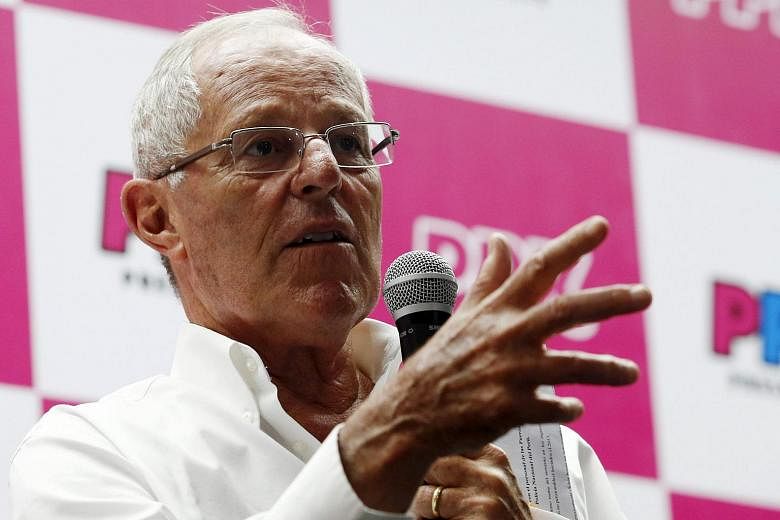LIMA (AFP) - Half of the candidates in Peru's presidential election have abandoned or been banned from next week's polls, and one of the leading contenders may follow, plunging the South American country into political uncertainty.
An electoral law in force since January has ruled several candidates out of the running in the April 10 contest. One is even running his campaign from a jail cell. Further disruption could come if accusations of vote-buying lead to the elimination of banker and economist Pedro Pablo Kuczynski, who is running second in the polls to the conservative Keiko Fujimori, daughter of Peru's jailed ex-leader Alberto Fujimori.
Their faces are already printed on 20,000 ballot papers, but they have each been accused of handing out money or gifts to voters during their campaigns. The new law passed in January cracks down on such activities.
The 40-year-old Fujimori was spared Friday when the National Electoral Board ruled her candidacy could move forward.
A local electoral court is hearing charges against 77-year-old Kuczynski. A ruling is due soon. Critics complain the new rule is being applied arbitrarily.
"We are the only country in the region with a law that allows for candidates to be banned from an election," said electoral expert Fernando Tuesta.
He said that had not happened since 1950 when the country was under a military dictatorship. The president of the electoral board, Francisco Tavara, insisted its judges were impartial. The law originally aimed to strengthen the multi-party system by eliminating vote-buying, said Tuesta.
But lawmakers toughened it so that now a candidate can be excluded even at the last minute before voting starts.
"It has brought us to a dead end," Tuesta said.
Electoral observers say the law sows uncertainty among voters.
"It allows for candidates to be excluded at a very late stage in the electoral process. That is a problem - it affects candidates and citizens," said Renate Weber, head of the European Union's observation mission.
The election race started with 19 candidates. Five were banned or dropped out before ballot cards were printed, and four more have given up since. Centrist economist Julio Guzman was barred for irregularities in party primaries. Another previous favorite, millionaire former governor Cesar Acuna, was banned for giving out money at a rally.
Of the remaining 10 contenders, leftist former governor Gregorio Santos is campaigning from jail where he is being held over corruption charges.And an investigation was launched Friday into former president Alan Garcia, who is running fifth in the polls.
Organization of American States head Luis Almagro wrote on Twitter Friday - after meeting with Guzman - that election officials should let the candidates kick off the ballot run to avoid a "semi-democratic" election.
The elections are a decisive moment for Peru, one of the fastest-growing economies in Latin America. While several of its major neighbours have slowed down, its economy grew by more than three per cent last year.
President Ollanta Humala, who took office in 2011 and has seen his popularity plummet, is barred from standing for re-election, while his Nationalist Party has pulled its presidential and congressional candidates because of little support.
By law, if a group does not receive at least five per cent of the vote, they will no longer be formally recognized as a political party.
The state ombudsman warned of "tension and mistrust with regard to the current electoral process," blaming "last-minute" amendments to the electoral law.
Analysts say it is the most turbulent election since 2000, when Alberto Fujimori was accused of cheating in his failed bid to win a third term.
Alberto Fujimori, 78, who also holds Japanese citizenship, is in jail for human rights crimes. He was convicted in 2009 for several crimes including his role in the killings of supposed guerrillas by a death squad in the 1990s, and is serving a 25 year sentence.
Despite that history, his daughter is polling as favourite to become Peru's next president.
A survey by pollster Datum published Friday showed that Fujimori had 36 per cent support in a first-round vote, and would then win a run-off, set for June 5.

